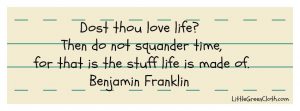Sometimes I wish I had an extra hour in my day. Well…to be honest…MOST days I wish for an extra hour in my day. Yet when Daylight Savings Time rolls around each fall, and I gain an hour, I can’t exactly say that I use that 60 minutes well. I try to remind myself that time is a commodity, just like money, and that I need to pay as close attention to how I spend my time as how I spend my money. The most valuable thing in my budget is my time. Teaching the concept of time management to children then can be especially hard since this is a life skill that we have often not developed ourselves. In fact, I think this post is a needed reminder for all of the grown-ups too. If this is the same for you, hopefully you can follow these tips right along with me while teaching how to make the most of the time that we have all been given.
- Prioritize. Pick out what you feel needs to be most important and spend time on that. Help children start wrestling through the hard concept that one person does not have time to do it all. When your kids have a to-do list, help them to identify a starting point and what tasks are okay to leave undone.
- Use a timer. If you are like me, maybe your biggest use of the timer outside of the kitchen was to put kids in time out for misbehaving. Why can’t we change the timer to have positive meaning? Discover just how versatile this little item can be.
- Play “Beat the clock.” Tell your kids, “If everyone gets their tasks done by a certain time, we will celebrate with popsicles or with a bike ride.” Then follow through with your promise. If you tend to have one child who completes tasks and another who does not, let the one who is done with his/her jobs stay up a bit later. Celebrate instead with a game or ice cream sundae. This way the child that is making the effort is not getting punished even though his/her sibling is not completing tasks.
- Time how long a task takes. Sometimes if I am feeling grumpy about completing a task, I will use my “count-up” function. For instance, dishes often only take twenty minutes or less. That is such a short amount of time – did we really need to complain? Helping kids to realize that if they would just complete their tasks, they could move on to more enjoyable activities. Procrastination may delay the job, but it also often takes away the time for fun.
- Time your kids’ bedtime routine. Tell them if they can get ready for bed in 10 minutes consistently, then they can go to bed later. Revert back to the earlier bed times if they seem to lose this skill.
- Teach kids to get the hard stuff done first. It’s kind of like the book / movie “Eat That Frog”… If we start with our most dreaded task, then the others naturally seem easier. We often can find time to complete desirable activities, but if we still have a burdensome chore waiting for us, the fun stuff will not seem so fun.
- Demonstrate to your kids the importance of doing their best the first time. I distinctly remember getting called back to wash a dirty dish again whenever I tried to rush. Focusing the first go-around may have taken longer initially, but doing well would have saved me time in the long run. In addition, teach kids to also be efficient. For instance, gather all of the dishes before starting to wash them, rather than having to continually leave the sink to clear the table. (Dishes seems to be my theme this time – I think it is because they always seem to multiply. 🙂 )
- Don’t overbook your family’s schedule and set yourself up for failure. Fall seems to be the time of year when our household schedule gets set. Filling in lots of activity is so easy to do. Instead take a step back and decide what is most important. Being gone every afternoon and evening will naturally lead to stressed out kids and parents. We have now taken a full circle and are back to the prioritizing step. Determine as a family how you want to spend your waking hours. If family movie night is how you connect, write that time in your schedule. If going for bike rides is how you all unwind, set aside time. Allow enough wiggle room for spontaneity. Make time together important enough to schedule.







Leave a Reply